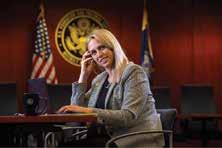
4 minute read
Friend of the Court
JAMIE RIGLING HELPS RELEASED PRISONERS LAUNCH NEW LIVES By ROBB MURRAY ‘95 When Jamie Rigling helps formerly incarcerated people register to vote, or obtain a state ID, or use the internet and put a resume together, she does so from a unique place of empathy. “I know a little bit what it’s like because my father was incarcerated before I was born,” she said. “So he had the real struggles of being a felon. We struggled with housing. We struggled with employment. And I was the child that people would tell their children to stay away from because my family was bad business.”
In her latest role advocating for people she feels deserve a second chance, this graduate of Minnesota State Mankato’s social work program is a Community Intervention Administrator for the state of Minnesota. That job follows a nine-year stint at the federal prison in Waseca as its Reentry Affairs Coordinator. She’s also an integral part of a relatively new program called Re-entry Court. Re-entry Court brings together a variety of professionals from both inside and outside the criminal justice system—the U.S. Attorneys Office, federal judges, public defenders, probation officers, social workers, mentors, substance abuse and mental health specialists. That team works together to help those released from prison transition back into society. “That’s the platform I use to figure out what my clients need,” she said. “I’m the person who dissects things, and I do it individually to be able to look at it from a macro level. When I keep seeing the same identification issues, I know we have a systems problem. When I keep seeing the same driver’s license issues, I know we have a systems problem.” Rigling took her current job with the U.S. Probation and Pretrial Service in 2019. Since transferring from the Bureau of Prisons, her work areas and accomplishments have been impressive. Among them: • Helping with state-issued identification. Upon leaving prison, many inmates have no legal, current form of ID. Thanks in part to Rigling’s (and many others) advocating, Gov. Tim Walz signed into a law a set of new rules governing IDs to use prison identification as a secondary form. • Voter registration. Once released inmates have completed their probation terms, they’re eligible to have voting rights restored. After working with the Minnesota League of Women Voters and other advocates, U.S. Probation and Pretrial Services successfully registered hundreds of former inmates to vote.
• Workforce development. Rigling recently spent two years working with the chief U.S. probation officer and colleagues to create a workforce development room that will open this year. Nancy Fitzsimons, a professor of social work at Minnesota State Mankato, said Rigling’s desire to help people and the degree with which she’s dug into changing systems makes her unique. “The work that she’s doing and how driven she is—I don’t think is typical,” Fitzsimons said. “She’s a clinical social worker who has enormous knowledge of and an interest in transforming systems. For somebody who has that clinical background and that clinical licensure to also be doing system work, and to be part of a more innovative approach to supporting people coming out of the prison system, I think is a little extra. I think that’s a little special.” Rigling’s reason for doing the work she does is simple: She wants to be part of the solution. “It’s like, ‘OK, there are 20 people coming out of prison this month,” she said. “How long have they been down? What is their need? How can we embed them into our communities at the least risk to the public as possible?” she said. “You’re either part of the solution or part of the problem. I’m not saying ‘Let’s have a welcome home party for people coming out of prison.’ But let’s be part of the solution and hire people with criminal backgrounds. Welcome them into your neighborhood and into your church or into your world.” Rigling, with her firsthand experience, is a firm believer in second chances. It’s that empathy that makes her a standout in what she does.
“The work that she does today certainly is coming out of her own personal and family experience and sort of this commitment to supporting people in creating a better life and giving people a second chance,” Fitzsimons said. Rigling said living that life gave her a unique perspective, understanding what incarceration can do to a family. She also knows the power of giving people a second chance. “I just hope that by being a voice in our communities and going back into prisons talking to the inmates on the inside and telling them how to prepare will help influence one little area,” she said. “Maybe it will encourage others to part of solution to systematic barriers people are unnecessarily facing.” Reprinted from Today magazine, March 3, 2021 edition.




